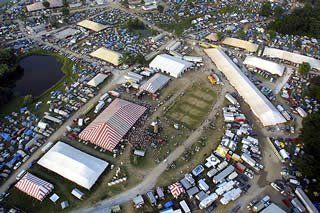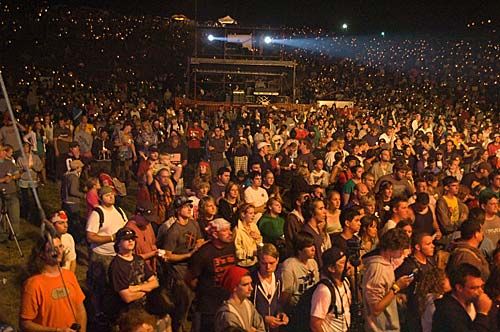After 29
years of touching hundreds—no, thousands—of families, it has come to an
emotional end. Yet, many people have
never even heard of the Cornerstone Music Festival. It was not just a music event. It was not just an outreach. It was not just a place for deep
conversations. It was a community. A community of Christian believers that gave
attendees a little glimpse of what heaven will be like when people of all
nations, tribes, and tongues will bow down and worship the One and Only Triune
God.
Of course,
the festival did not have someone from every group of people in the world at
the same time, but the variety sure stimulated a vision of what is to
come. Over the years people from every
state—yes, every state—and every
continent (except Antarctica) has come to Cornerstone. Two of the many people I found interesting were
a Native American 70-something couple.
They had lived all their lives on a reservation in the western U.S., but
they had to bring an interpreter with them since their English was
inadequate. Fortunately, their stories
and their love for Christ were far from inadequate.
 |
| Portion of the Festival grounds 2001 photo by Andrew Winiger, posted on Facebook Cornerstone Memories |
I began
writing this blog entry many times and got off on various tangents, primarily
because Cornerstone has touched my family—and the lives of others—in so many
ways. I couldn't decide whether to try
to explain the different components of Cornerstone, to tell you of its origins,
to talk about what we did at the festival (including our volunteer work), or to
share stories of the 50 to 100 different festival goers who stayed at our house
over the years. Yet, each topic seemed
inadequate. Nothing captured the essence
of what made this event truly unique.
Hearing in
May that 2012 would be the last Cornerstone struck my family in the heart. We were not alone. In fact two different Facebook pages were
started as response by fans: Occupy
Cornerstone and Save Cornerstone Farm.
The festival happened during the week of July 4, before the Wetzel Hall
implosion, but I could not really write about it until after I wrote about the
implosion. I guess my emotional response
to Cornerstone's ending hampered my ability to speak. Ironically, sometimes my being emotional
makes words flow out of my mouth like a waterfall.
Cornerstone
was often hot and dirty with lots of walking.
There never seemed to be enough shade or breeze. We carried jugs of
water with us, which was bulky and awkward, but we always seemed to run
out. When it wasn't hot and dry, it was
raining and extremely muddy. Camping on
the festival grounds did not usually work for us. Not counting the inconveniences that come
with camping and sleeping on uneven ground, the nights would be long and
loud. Even so, I camped out with some of
my daughters for 3 of the nights this year.
Mind you, this year the day time temperatures ranged from 97 to 103 with
no air conditioning available anywhere except for the few people who had
reserved camper spaces and had it in their campers. The night time temperatures were generally
warm, too, except one night I think it might have gotten down to the 70's and
felt "cool." Why did I do
it? I don't even like sitting in my own
yard if it is not quite the "right" temperature. Why?
It was Cornerstone.
 |
| Crowd at Main Stage when attendance was about 25,000; at the same time, bands were playing in tents in other parts of the Festival (from Facebook Save Cornerstone Farm) |
I would
like to say, "You had to be there to understand," but it is more than
that. It had to get under your skin. Then you would understand. Interestingly, the only common denominator
for many festival attendees was a love of Jesus—or seeking to know him. That's it.
At
Cornerstone I met "professionals" (including a professor that had to
leave the festival one day early one year to be a speaker at a conference at
Oxford University in the United Kingdom).
Of course, I also met families that fall into the "middle
class" just as my family does. However, a great number of those at the
festival live on the fringe of society. This
last group was the original intended audience 29 years ago. Often overlooked by mainline denominations,
those that felt unloved and unwanted could find hope, direction, and love in
the ministries of Jesus People, USA (JPUSA for short). JPUSA purposely chose bands for the Cornerstone
Festival that could deliver the good news of Jesus Christ in a style that spoke
to this last group. It worked. Fortunately for my ears, JPUSA also included bands
with other styles of music. As a
result, Cornerstone grew into something more than an event that targeted a
particular listening audience, but one that became corporate
worship--many individuals coming
together as "one church" and a speaking of many tongues through
native languages and varied music styles with one purpose—to praise and worship
our Lord. Truly, Cornerstone has touched
my family—and countless others—and will have an influence over the years that I
cannot begin to fathom.
If you would like more on the history of the Cornerstone Music Festival, you might want to read this article from Christianity Today.
If you would like more on the history of the Cornerstone Music Festival, you might want to read this article from Christianity Today.
No comments:
Post a Comment